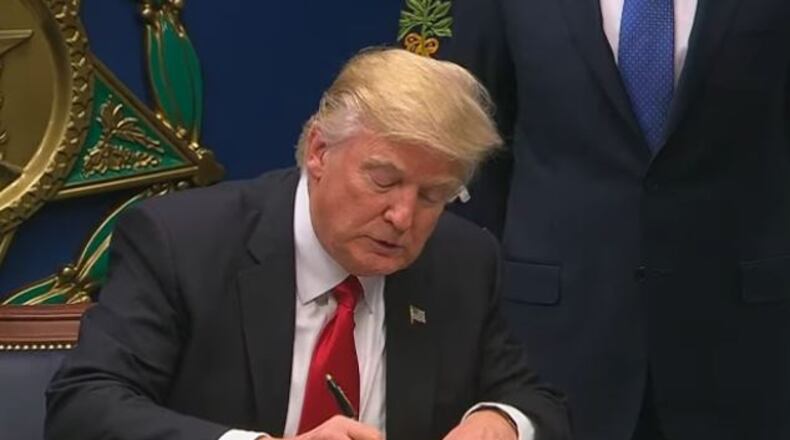With his original executive order on travel and immigration stymied in the courts, President Donald Trump on Monday set out a new plan to again limit visitors from certain countries, and step up reviews on refugees coming into the United States, with the details changed in a number of ways to ensure that it can pass legal muster in the weeks and months ahead.
The revised plan puts a 90 day hold on new travel from six Muslim-majority countries designated as posing a national security risk, temporarily suspends the refugee admissions program for 120 days, and sets in motion a series of efforts to improve the screening of refugees and other travelers who want to come to the U.S.
It would take effect in ten days, on March 16.
"This is not a Muslim ban in any way, shape, or form," said a senior administration official in a morning press call with reporters.
The changes from the original executive order include:
+ The ban on new travelers from a group of majority-Muslim nations will no longer include Iraq. There will still be a suspension on new entries from Iran, Libya, Sudan, Somalia, Syria and Yemen. That means six countries are part of this added scrutiny, down from seven in the original order.
+ As part of the change involving Iraqi travelers, U.S. officials said that the Government of Iraq has agreed to enhance its travel documents and other screening of travelers, as well as agreeing to allow the United States to return nationals to Iraq if those people are determined to be a threat to security.
+ The travel changes in this revised executive order will only apply to future applicants for U.S. travel approval - in other words, anyone who already has a legal visa to enter the U.S. will be allowed to do so. "Per the Executive Order, foreign nationals from Sudan, Syria, Iran, Libya, Somalia, and Yemen who have valid visas will not be affected by this Executive Order," the administration said in a fact sheet about the changes.
+ Those people who had visas revoked when the original executive order was being enforced will have those visas and travel permissions restored. "The Department does not plan to revoke any visas provisionally due to this executive order," a State Department official said this morning.
+ The indefinite suspension of the Syrian refugee program has been dropped in the new order. "All nationalities are treated the same," an official said. "So, there is no blanket ban on Syrian refugees?" a reporter asked. "That's correct," the official replied.
+ Language in the original order that allowed a special preference for Christian refugees from Muslim-majority countries has been dropped from the new executive order. "That part of the executive does not exist in the new executive order," an administration official said.
+ The new order does not effect green card holders, legal permanent residents of the United States, people who have dual nationalities - basically anyone who has already been approved to come into the United States, they will not have those travel documents revoked by this order.
+ The order will not take effect immediately, to give time for immigration and customs personnel to be briefed on what exactly is changing. "We're going to have a very smooth implementation period," an official explained, saying there should be no immediate surge in airport stops creating what an official labeled "alleged chaos" at some airports in the U.S.
As for the legal challenges to the original executive order, a Department of Justice official said those would in a sense be "mooted" by this new order.
"The Department of Justice will be filing the appropriate briefs and letters with the courts in those existing cases," the official told reporters.
President Trump had vowed to fight on in the courts for his original order - "SEE YOU IN COURT" - but that came apart just hours after this new order was signed.
"As explained below, the New Executive Order sets forth policies substantially different from the policies in Executive Order No. 13,769," the feds wrote in a submission to federal Judge James Robart, who put the Trump plan on hold in early February.
"The New Executive Order clarifies and narrows the scope of Executive action regarding immigration, extinguishes the need for emergent consideration, and eliminates the potential constitutional concerns identified by the Ninth Circuit," the Justice Department said in a submission.
"The President has capitulated on numerous key provisions blocked by our lawsuit," said Bob Ferguson, the Attorney General of Washington State, "including bans on Green Card holders, visa holders and dual citizens, an indefinite ban on Syrian refugees, and explicit preferences based on religion."
The State of Washington's case led two court rulings against the White House, which left President Trump thoroughly frustrated in early February.
Monday's legal filings by the feds were a remarkable change from what the President had said in early February, after a three judge panel on the Ninth Circuit Court of Appeals had refused to allow the President's order to go into effect.
"It is thus respectfully submitted that the New EO falls outside of this Court’s injunction," the feds wrote to Judge Leonie Brinkema, who blocked the enforcement of the original order in the state of Virginia, one of multiple notices sent on Monday.
And while the White House touted the new plan, it certainly wasn't the first choice.
Here are links to the background documents distributed by the Trump Administration:
The text of the revised executive order even goes so far as to defend the original order, denying that it provided a "basis for discriminating for or against members of any particular religion."
The new order also noted the court challenges against the original Trump order as well.
Credit: Jamie Dupree
Credit: Jamie Dupree
About the Author
The Latest
Featured




